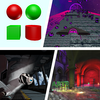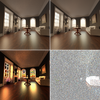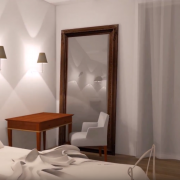Research question: The main research question addressed by the SFB “Advanced Computational Design” is how to advance design tools and processes through multi- and interdisciplinary basic research in the areas of digital architecture, integrated building design, computer graphics and virtual reality, discrete and applied geometry, and computational mechanics.
Wider research context: Architecture, Engineering and Construction (AEC) shapes our built environment, exerting substantial environmental, cultural and economic influence on society. However, it is among the least digitized industries, still caught in silo-thinking and sequential planning processes. The Information and Communication Technology field, on the other hand, is highly innovative, creating digital design tools that are well-founded in basic research, but often lack relevant domain knowledge, thus hardly meeting designers’ needs.
Innovation: We will connect architecture, computer science, mathematics and engineering in order to develop advanced computational design tools able to incorporate implicit and explicit design knowledge. This unique combination of scientific disciplines and collaborative research with strong theoretical foundations aims to bring radical innovation in computational design by allowing immediate feedback already in early design phases and by expanding solution spaces by computing design variants that cannot be found by current methods.
Approach: The proposed research is structured in three areas: Design Methodology (A1), Visual and Haptic Design Interaction (A2) and Form Finding (A3). A1 uses ontologies to describe AEC design semantics, coupled to a novel digital mixed-reality sketchbook, and an innovative implicit modeling approach based on retrieving and enhancing 2D images and 3D point clouds through transfer learning. A1 also acts as a platform for integrating and evaluating the computational tools and methods developed in A2 and A3. These areas will investigate research questions in computational design involving algorithmic solutions. A2 investigates real-time global-illumination and optimization algorithms for lighting design, as well as a new method for large-scale haptic interactions in virtual reality based on a mobile robotic platform. In A3, form finding will be explored regarding geometric, mechanical and material constraints, in particular: paneling of complex shapes by patches of certain surface classes while optimizing the number of molds; algorithms for finding new transformable quad-surfaces; mechanical models for an efficient simulation of bio-composite material systems. Furthermore, new ways of form-finding will be explored experimentally, which will allow for validating the developed algorithmic approaches and reconsidering model assumptions and constraints.
Added value: The fundamental computational tools and methods to be developed will be applicable in AEC and other fields of the creative industries.
Funding
- FWF - Österr. Wissenschaftsfonds
Project Partner
Team
News
Publications
| Image | Bib Reference | Publication Type |
|---|---|---|
| 2025 | ||
 |
Christian Freude , Lukas Lipp , Lukas Lipp , Matthias Zezulka, Florian Rist, Michael Wimmer , Matthias Zezulka, Florian Rist, Michael Wimmer , David Hahn , David Hahn Inverse Simulation of Radiative Thermal Transport Computer Graphics Forum, 44(2):e70048, April 2025. [  paper] paper] |
Journal Paper with Conference Talk |
 |
Annalena Ulschmid , Katharina Krösl , Katharina Krösl , Michael Wimmer , Michael Wimmer , Bernhard Kerbl , Bernhard Kerbl Automated Prioritization for Context-Aware Re-rendering in Editing SN Computer Science, 6(2025), 2025. [  paper] [GitHub] paper] [GitHub] |
Journal Paper (without talk) |
 |
Pierre Ecormier-Nocca , Lukas Lipp , Lukas Lipp , Annalena Ulschmid , Annalena Ulschmid , David Hahn , David Hahn , Michael Wimmer , Michael Wimmer Single-Exemplar Lighting Style Transfer via Emissive Texture Synthesis and Optimization In Proceedings of the 20th International Joint Conference on Computer Vision, Imaging and Computer Graphics Theory and Applications - GRAPP, pages 113-126. 2025. [  image] [ image] [ paper] paper] |
Conference Paper |
 |
Marlene Huber , Simon Kloiber , Simon Kloiber , Annalena Ulschmid , Annalena Ulschmid , Agata Marta Soccini, Alessandro Clocchiatti, Hannes Kaufmann , Agata Marta Soccini, Alessandro Clocchiatti, Hannes Kaufmann , Katharina Krösl , Katharina Krösl Exploring Seated Locomotion Techniques in Virtual Reality for People with Limited Mobility In Proceedings of the 20th International Joint Conference on Computer Vision, Imaging and Computer Graphics Theory and Applications - GRAPP, pages 161-173. 2025. [  image] [ image] [ paper] paper] |
Conference Paper |
| 2024 | ||
| Moritz Meier Simulating Windows for Lighting Design Optimization |
Bachelor Thesis | |
Markus Königsberger, Valentin Senk, Markus Lukacevic , Michael Wimmer , Michael Wimmer , Josef Füssl , Josef FüsslMicromechanics stiffness upscaling of plant fiber-reinforced composites COMPOSITES PART B-ENGINEERING, 281:1-20, July 2024. [  paper] paper] |
Journal Paper (without talk) | |
 |
Lukas Lipp , David Hahn , David Hahn , Pierre Ecormier-Nocca , Pierre Ecormier-Nocca , Florian Rist, Michael Wimmer , Florian Rist, Michael Wimmer View-Independent Adjoint Light Tracing for Lighting Design Optimization ACM Transactions on Graphics, 43(3):35, May 2024. |
Journal Paper with Conference Talk |
Shervin Rasoulzadeh , Michael Wimmer , Michael Wimmer , Philipp Stauß , Philipp Stauß , Iva Kovacic , Iva Kovacic Strokes2Surface: Recovering Curve Networks From 4D Architectural Design Sketches Computer Graphics Forum, 43(2):1-16, May 2024. |
Journal Paper (without talk) | |
 |
Annalena Ulschmid , Bernhard Kerbl , Bernhard Kerbl , Katharina Krösl , Katharina Krösl , Michael Wimmer , Michael Wimmer Real-Time Editing of Path-Traced Scenes with Prioritized Re-Rendering In Proceedings of the 19th International Joint Conference on Computer Vision, Imaging and Computer Graphics Theory and Applications - GRAPP and VISIGRAPP, pages 46-57. February 2024. [  paper] [GitHub] paper] [GitHub] |
Conference Paper |
| 2023 | ||
| Matthias Zezulka Bidirectional MATLAB/C++ Interface for Lighting Design Optimization |
Bachelor Thesis | |
| David Köppl Gradient-based Light Optimization with Variable Light Count: Dynamic Generation and Merging of Light Sources [  BSc Thesis] BSc Thesis] |
Bachelor Thesis | |
 |
Christian Freude , David Hahn , David Hahn , Florian Rist, Lukas Lipp , Florian Rist, Lukas Lipp , Michael Wimmer , Michael Wimmer Precomputed radiative heat transport for efficient thermal simulation Computer Graphics Forum, 42(7):e14957, November 2023. [  paper] paper] |
Journal Paper with Conference Talk |
Michael Wimmer Advanced Computational Design, 7. October 2023, Stuttgart |
Invited Talk | |
Julia Reisinger, Shervin Rasoulzadeh , Bálint Istvan Kovács, Peter Ferschin , Bálint Istvan Kovács, Peter Ferschin , Khrystyna Vasylevska , Khrystyna Vasylevska , Michael Hensel , Michael Hensel , Iva Kovacic , Iva Kovacic , Michael Wimmer , Michael Wimmer Integrating AEC Domain-Specific Multidisciplinary Knowledge for Informed and Interactive Feedback in Early Design Stages In Advances in Information Technology in Civil and Building Engineering: Proceedings of ICCCBE 2022 - Volume 2, pages 153-170. October 2023. |
Conference Paper | |
| Matthias Preymann Scripting Automation for Tamashii [  BSc thesis] BSc thesis] |
Bachelor Thesis | |
| Mathias Schwengerer Inverse Method for Baked Lighting [  Thesis] Thesis] |
Bachelor Thesis | |
 |
Bálint Istvan Kovács, Ingrid Erb, Kiumars Sharifmoghaddam, Lukas Lipp , Michael Wimmer , Michael Wimmer , Peter Ferschin , Peter Ferschin The theatre metaphor for spatial computing in architectural design In Proceedings of the Creative Construction Conference 2023, pages 674-683. June 2023. [  paper] paper] |
Conference Paper |
 |
Johannes Unterguggenberger , Bernhard Kerbl , Bernhard Kerbl , Michael Wimmer , Michael Wimmer Vulkan all the way: Transitioning to a modern low-level graphics API in academia Computers and Graphics, 111:155-165, April 2023. [  paper] [Vulkan Launchpad] [Auto-Vk] [Auto-Vk-Toolkit] paper] [Vulkan Launchpad] [Auto-Vk] [Auto-Vk-Toolkit] |
Journal Paper (without talk) |
 |
Christian Freude , Hiroyuki Sakai , Hiroyuki Sakai , Karoly Zsolnai-Fehér , Karoly Zsolnai-Fehér , Michael Wimmer , Michael Wimmer Sampling-Distribution-Based Evaluation for Monte Carlo Rendering In Proceedings of the 18th International Joint Conference on Computer Vision, Imaging and Computer Graphics Theory and Applications, pages 119-130. 2023. [  image] [ image] [ paper] paper] |
Conference Paper |
| 2022 | ||
Shervin Rasoulzadeh , Michael Wimmer , Michael Wimmer , Iva Kovacic , Iva Kovacic Strokes2Surface: Recovering Curve Networks from 4D Architectural Design Sketches for Shape Inference, 12. October 2022, |
Invited Talk | |
 |
Michael Landauer Kido: a hardware-accelerated lighting planning software [  thesis] thesis] |
Bachelor Thesis |
 |
Michael Wimmer , Iva Kovacic , Iva Kovacic , Peter Ferschin , Peter Ferschin , Florian Rist, Michael Hensel , Florian Rist, Michael Hensel , Kristina Schinegger, Stefan Rutzinger, Hannes Kaufmann , Kristina Schinegger, Stefan Rutzinger, Hannes Kaufmann , Martin Kilian , Martin Kilian , Christian Müller, Ivan Izmestiev , Christian Müller, Ivan Izmestiev , Georg Nawratil, Josef Füssl, Milena Stavric , Georg Nawratil, Josef Füssl, Milena Stavric , David Hahn , David Hahn , Georg Suter , Georg SuterAdvanced Computational Design – digitale Methoden für die frühe Entwurfsphase Bautechnik, 99(10):720-730, August 2022. |
Journal Paper (without talk) |
Soroosh Mortezapoor , Christian Schönauer, Julien Rüggeberg , Christian Schönauer, Julien Rüggeberg , Hannes Kaufmann , Hannes Kaufmann Photogrammabot: An Autonomous ROS-Based Mobile Photography Robot for Precise 3D Reconstruction and Mapping of Large Indoor Spaces for Mixed Reality In Proceedings of 2022 IEEE Conference on Virtual Reality and 3D User Interfaces Abstracts and Workshops (VRW), pages 101-107. April 2022. |
Conference Paper | |
| 2021 | ||
 |
Soroosh Mortezapoor , Khrystyna Vasylevska , Khrystyna Vasylevska Safety and Security Challenges for Collaborative Robotics in VR In Proceedings of the 1st International Workshop on Security for XR and XR for Security (VR4Sec) at Symposium On Usable Privacy and Security (SOUPS) 2021, pages 1-4. August 2021. |
Conference Paper |
| undated | ||
Chuyan Zhang (unknown) Supervisor: Michael Wimmer  Duration: September 2025 — |
Ongoing PhD-Thesis | |

